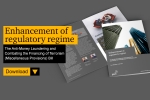
The advantages of the International Financial Centre of Mauritius
by Dheerend Puholoo, PwC Tax Leader (published in The Investor's Guide 2023)
Mauritius has over the years emerged and positioned itself as a reputable and resilient international financial center (IFC). With no major natural resources, it heavily relied on its educated population to reengineer its economic growth in different sectors, including the Financial Services sector. This growth has also to a large extent been spearheaded by the bold fiscal measures taken by the government of Mauritius.
The country is known today as a jurisdiction of substance, with a stable and mature tax system. As an IFC, it is fully compliant with international standards. It embraced all the relevant changes under the Base Erosion Profit Shifting project (BEPS) and is actively participating in the latest and ongoing OECD Pillar 2 implementations. It proactively takes all the necessary steps to be on the whitelists of the OECD, EU and FATF, which are fundamentals to international business operations. It also has a robust and well-regulated banking system, with many international banks having their footprints in the country.
With globalisation leading to more cross border transactions, a competitive tax rate is important to attract investments, and the rate in Mauritius has progressively gone down over the last few decades. Mauritius operates a self-assessment system of taxation, a common feature of a modern tax system, shifting the onus of declaration on taxpayers. It is simple and largely based on a flat rate of 15% for both corporates and individuals. There are certain additional levies on Banks and Telecom companies making the tax rate mildly progressive.
Transparency and certainty are the other key features which contributed to the success of the Mauritius tax system. Taxpayers can apply for rulings to provide comfort on transactions, and these are in the public domain. The Mauritius Revenue Authority (MRA) adheres to international norms and judicial precedent and has a well-established dispute resolution process, involving independent teams and panels to protect the rights of taxpayers. The Assessment Review Committee is the first level of appeal, going all the way to the Supreme Court, and the ultimate court of appeal remains the Privy Council of the United Kingdom.
A strong network to incentivise investors
Conscious of its needs to work in partnership with other tax jurisdictions, Mauritius has rigorously worked on its tax treaty network. It has a wide network of signed tax treaties (45) and a strong pipeline of around 33 tax treaties which are either being negotiated or are awaiting signature or ratification. The country has in place two major free trade agreements, one with China (Mauritius-China FTA) and one with India (CEPCA) and this enables Mauritius to act as a bridge to Asia.
Among its network is a series of African countries, and its membership to trade blocs such as COMESA and SADC and implementation of AfCFTA, has elevated the country’s reputation as the “Gateway to Africa”. As a testimony, Mauritius is ranked first in Africa in terms of “Ease of Doing Business” and “Ease of Paying Taxes” according to the latest World Bank annual ratings. On the international front, the country ranked 13th in the “Ease of Doing Business” and 5th in the “Ease of Paying Taxes” (among 190 economies).
As an IFC, Mauritius acts diligently to embrace changes and remain compliant with international norms, bringing the reforms to keep pace with an ever-changing business environment
Tax Information Exchange necessary to establish Mauritius as transparent jurisdiction
The Island is a signatory to the Multilateral Competent Authority Agreement (MCAA) and exchanges information on an automatic basis with other tax authorities under the OECD Common Reporting Standard (CRS) since 2018. Information is also being exchanged on an automatic basis under Foreign Account Tax Compliance Act (FATCA) with the Internal Revenue Service (IRS). The Global Forum has also confirmed that Mauritius has successfully implemented the Automatic Exchange of Information (AEOI) standard. All these initiatives ensure that Mauritius remains on the European Union (EU) whitelist making investors subject to lower due diligence.
The signature and ratification of the Multilateral Convention on Mutual Administrative Assistance in Tax Matters in 2015 has brought a broad network of Tax Information Exchange Agreements, providing the country with mechanisms for exchange of information with some 140 jurisdictions including all EU member States. In its second-round report for Mauritius, the Global Forum has commended the efforts of the country to expand its exchange of information network. However, before responding to any queries, the local tax authority ensures that due care is exercised to avoid fishing expeditions, thus protecting investors.
Combating money laundering and the financing of terrorism
The country has an established regulatory framework to combat money laundering and the financing of terrorism, principally through the following legislations: The Financial Intelligence and Anti-Money Laundering Act 2002, The Prevention of Corruption Act 2002 and The United Nations (Financial prohibitions, arms embargo and Travel Ban) Sanction Act 2019. Mauritius has fully complied with all 40 Financial Action Task Force (FATF) recommendations. This gives investors comfort over the integrity of the local financial system and the safety of the investment through Mauritius.
Salient fiscal measures and incentives
As an IFC, Mauritius acts diligently to embrace changes and remain compliant with international norms, bringing the reforms to keep pace with an ever-changing business environment. Its tax legislations are largely based on the UK and New Zealand models, ingraining a sound level of comfort in the system. Below are a few salient fiscal measures / incentives emanating from different legislations:
- Companies, partnerships, trusts and foundations are eligible to claim 80% exemption on interest and foreign dividend. Therefore, investors are subject to a maximum effective rate of tax of 3% and, often, this may be reduced to nil where a high foreign tax has been suffered.
- Asset managers and administrators also enjoy the 80% tax exemption. This measure is particularly attractive for foreign investment managers to locate in Mauritius given the lower cost base.
- There is no withholding tax upon repatriation of dividends from a Mauritius resident entity to its shareholders or upon repatriation of interest made out of foreign source income.
- Various tax holidays are available in order to boost specific sectors, including financial services, for example, global headquarter administration and treasury activities, manufacture of pharmaceutical products etc.
- There is no capital gains tax regime in Mauritius.
- There are no exchange control regulations and repatriation of funds can be done freely.
- Income from export of goods is subject to tax at 3% in order to incentivise local manufacturers.
- A favourable foreign tax credit mechanism is available to tax residents to enable them to claim relief in respect of foreign tax suffered, thus avoiding double taxation and potentially reducing the Mauritius tax to nil.
- Double deductions for expenses are available on market research and product development for the African market and on purchase of specialised software.
- VAT Refunds are fast tracked and can be done within a period of seven (7) days.
- Individuals are taxed on a remittance basis on their foreign income.
Addressing the current megatrends
BEPS was born in the wake of the global financial crisis of 2008/2009. This brought an overhaul to the international tax system, and Mauritius adapted to the new ecosystem smoothly whilst maintaining the country’s competitiveness.
In the aftermath of the pandemic and the ongoing effects of the war between Russia and Ukraine, countries are once more under pressure to increase tax revenue collection to meet their needs. This has triggered the Global Minimum Tax initiative under Pillar 2, which undermines the tax competitiveness of jurisdictions like Mauritius.
In addition, we are seeing the emergence of more sophisticated IFCs like Dubai and Rwanda, and lately the setting up of India’s International Financial Services Centre. Therefore, while Mauritius has been successful so far, we should not rest on our laurels and accordingly keep pace with the fast-changing environment and implement the right incentives.
Contact us














